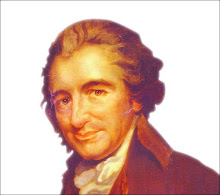"A
thousand years hence (for I must indulge a few thoughts), perhaps in
less, America may be what Europe now is. The innocence of her character,
that won the hearts of all nations in her favor, may sound like a
romance and her inimitable virtue as if it had never been. The ruin of
that liberty which thousands bled for or struggled to obtain may just
furnish materials for a village tale or extort a sigh from rustic
sensibility, whilst the fashionable of that day, enveloped in
dissipation, shall deride the principle and deny the fact.
When
we contemplate the fall of empires and the extinction of the nations of
the Ancient World, we see but little to excite our regret than the
mouldering ruins of pompous palaces, magnificent museums, lofty pyramids
and walls and towers of the most costly workmanship; but when the
empire of America shall fall, the subject for contemplative sorrow will
be infinitely greater than crumbling brass and marble can inspire. It
will not then be said, here stood a temple of vast antiquity; here rose a
babel of invisible height; or there a palace of sumptuous extravagance;
but here, Ah, painful thought! the noblest work of human wisdom, the
grandest scene of human glory, the fair cause of Freedom rose and fell."
Thomas Paine, Letter to George Washington (1796)
The entire letter can be found here: http://www.thomas-paine-friends.org/paine-thomas_letter-to-george-washington-1796-01.html
Friday, September 28, 2012
Sunday, September 2, 2012
Thomas Paine on Time and Space.
"It is difficult beyond description to conceive that space can have no end; but it is more difficult to conceive an end. It is difficult beyond the power of man to conceive an eternal duration of what we call time; but it is more impossible to conceive a time when there shall be no time." Thomas Paine, Age of Reason, Part First, Section 7.
Saturday, September 1, 2012
Thomas Paine - a noble of nature
In research into nineteenth century literature on Thomas Paine, one frequently sees him referred to as "that noble of nature." A widely published collection of his poetry was so titled. This appears to be the source of the phrase:
“Whoe'er amidst the sons Of reason, valor, liberty and virtue,
Displays distinguished merit, is a noble Of Nature's own creating.”
James Thomson
Coriolanus (act III, sc. 3)
“Whoe'er amidst the sons Of reason, valor, liberty and virtue,
Displays distinguished merit, is a noble Of Nature's own creating.”
James Thomson
Coriolanus (act III, sc. 3)
Subscribe to:
Posts (Atom)



